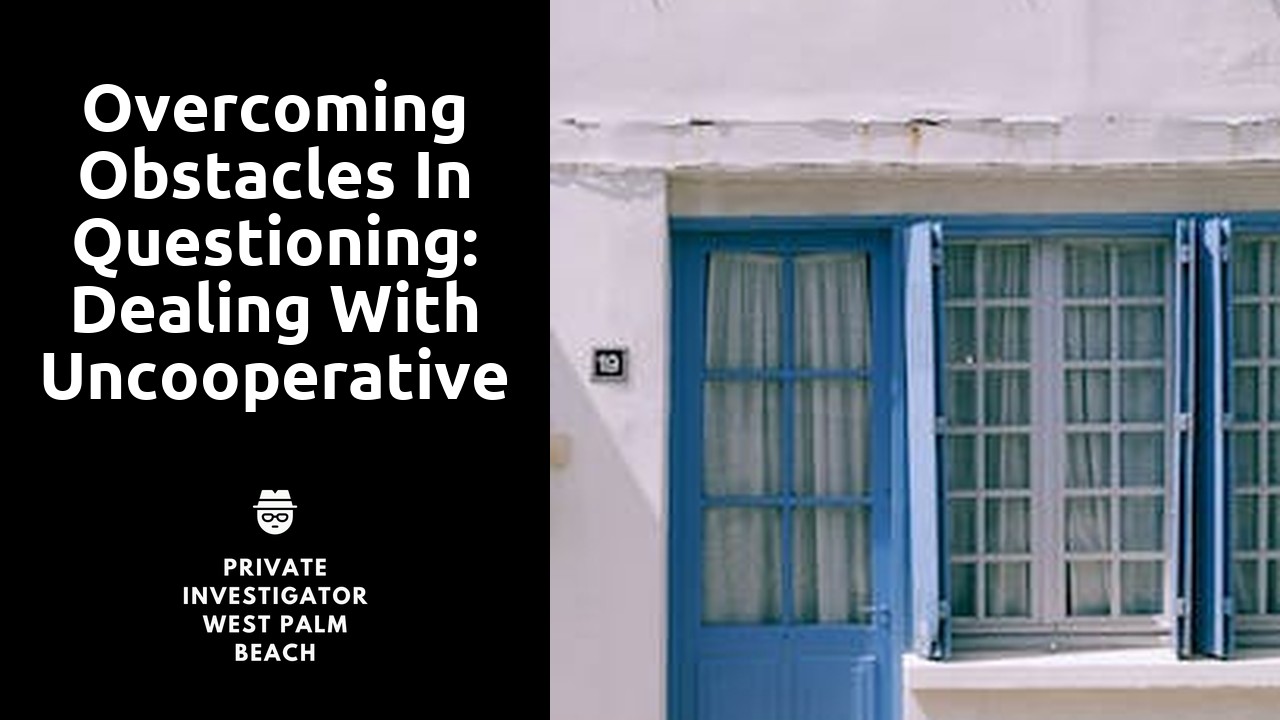
Overcoming Obstacles in Questioning: Dealing with Uncooperative Witnesses
Confronting Challenging Witnesses: A Guide for Effective Questioning
Effective questioning is the key to confronting challenging witnesses during legal proceedings. When faced with difficult witnesses, it is crucial to maintain a professional tone and approach. Building rapport with the witness can help to establish trust and encourage them to provide valuable information. By creating an environment that is respectful and conducive to open communication, it is more likely that the witness will be more forthcoming with their testimony.
In addition to establishing a positive rapport, it is important to ask clear and focused questions. Ambiguous or leading questions can result in vague or misleading answers. By asking precise and specific questions, the clarity of the witness's responses improves, ensuring that the information obtained is accurate and relevant. Effective questioning techniques can help to break down barriers and extract valuable information from even the most challenging witnesses.
Mastering the Art of Extracting Information: Strategies for Dealing with Difficult Witnesses
Difficult witnesses can pose unique challenges for those seeking to extract information. However, with the right strategies, it is possible to master the art of obtaining valuable insights from even the most uncooperative individuals. One effective technique is to establish a rapport with the witness. Building trust and creating a comfortable environment can help to break down barriers, leading to more open and honest communication. Additionally, active listening skills play a crucial role in successful information extraction. By patiently hearing out the witness and showing genuine interest, you can encourage them to share their perspectives and insights. This not only enhances the accuracy of the information obtained but also promotes a sense of collaboration and cooperation.
Breaking Down Barriers: Techniques to Overcome Resistance in Witness Testimony
Breaking down barriers and gaining cooperation from resistant witnesses is a formidable challenge faced by many legal professionals. However, with the right techniques and approaches, it is possible to overcome this resistance and extract valuable information from even the most uncooperative witnesses. One effective strategy is to establish rapport and create a comfortable environment for the witness to open up and share their testimony.
Building rapport involves treating the witness with respect, actively listening to their concerns, and showing empathy towards their situation. By demonstrating genuine interest and understanding, the witness may feel more inclined to cooperate and provide the information sought. Additionally, using open-ended questions can encourage the witness to elaborate on their answers, providing further insight and potentially uncovering valuable details. Furthermore, it is crucial to remain calm and composed during the questioning process, as any signs of frustration or aggression may further alienate the witness and perpetuate their resistance. By employing these techniques, legal professionals can navigate the challenges of questioning uncooperative witnesses and unlock the truth needed for a successful resolution.
The Power of Persuasion: Convincing Uncooperative Witnesses to Cooperate
In the challenging task of questioning uncooperative witnesses, one of the most powerful tools at your disposal is the art of persuasion. By skillfully employing persuasive techniques, you can increase your chances of eliciting cooperation and valuable information from these difficult individuals.
First and foremost, it is important to build rapport with the uncooperative witness. Establishing a connection and creating an environment of trust can go a long way in breaking down their barriers. Show empathy, actively listen, and acknowledge their perspective to demonstrate that you value their input. By doing so, you are more likely to gain their cooperation and encourage them to open up to you. Remember, persuasion is not about forcing or manipulating the witness, but rather about convincing them that their cooperation is in their best interest.
Unlocking the Truth: Navigating the Challenges of Questioning Uncooperative Witnesses
Navigating the challenges of questioning uncooperative witnesses can be a daunting task, requiring a delicate balance of skill and strategy. These witnesses may present obstacles, withholding valuable information or even blatantly lying. However, with the right approach, it is possible to unlock the truth and gain the information needed.
First and foremost, it is important to establish a rapport with the witness. Building trust and creating an atmosphere of comfort can encourage them to open up and share what they know. Active listening and empathetic responses can go a long way in conveying genuine interest, making the witness feel valued and understood. Additionally, patience is key when dealing with uncooperative witnesses. Pressuring or becoming confrontational may only exacerbate their resistance. Instead, adopting a calm and composed demeanor can help to diffuse tension and create a space where the witness feels more willing to cooperate.
Unraveling the Secrets: Approaches for Extracting Valuable Information from Uncooperative Witnesses
Witness testimony plays a crucial role in any investigation or legal proceeding. However, when witnesses are uncooperative or reluctant to share information, uncovering the truth can become a daunting task. In such situations, it is important for investigators and attorneys to employ effective approaches for extracting valuable information from uncooperative witnesses.
One approach is to create a comfortable and non-threatening environment. When witnesses feel at ease and believe that their concerns are being addressed, they are more likely to open up and share relevant details. Building rapport and establishing trust can be achieved by adopting a friendly and empathetic tone, actively listening to the witness, and demonstrating genuine interest in their perspective. Additionally, maintaining a calm and patient demeanor can help alleviate any power imbalances and encourage the witness to be more forthcoming with information. By creating a safe space for witnesses to share their knowledge, investigators can increase their chances of unraveling the secrets hidden within their testimony.
Related Links
Questioning in High-Stress Situations: Maintaining Control and Obtaining Accurate InformationThe Role of Active Listening in Effective Questioning
Integrating Psychological Understanding in Investigations
Using Psychological Profiling to Solve Cases
Psychological Tactics in Interrogation